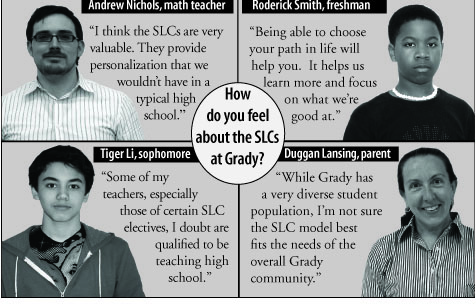
The small learning communities at Grady could be closed as soon as the 2012-13 school year, depending on the findings of a review of the small-school model in APS by superintendent Erroll Davis. The closure of the SLCs would return Grady to its former high school model just two years after they were introduced.
“[Davis] has said in institutions where [the small-school model] seems to be working, he will keep them in place,” said Keith Bromery, director of media relations for APS. “In other instances he may say based on his review that they may want to get rid of them. All options are on the table.”
Small schools, which were first introduced at Grady during the 2010-11 school year, were instituted in some form in all APS high schools as part of the High School Transformation under former superintendent Beverly Hall. The Bill and Melinda Gates Foundation provided a $13.6 million grant to APS as part of a nationwide initiative to encourage school districts to adopt the small schools model. In his 2009 letter about the work of the Gates Foundation, however, Bill Gates expressed disappointment with the results of the small-school model.
“Many of the small schools that we invested in did not improve students’ achievement in any significant way,” Gates wrote. “We are trying to raise college-ready graduation rates, and in most cases, we fell short.”
Bromery cited Carver High School, the first APS high school to switch to the small-schools format, as an example of a school where the small-school model has been effective.
At Carver, as at Grady, students choose to enroll in one of four schools. Unlike Grady, however, students at Carver take all their classes within their small school. Grady alumnus Matt Westmoreland, a social studies teacher at Carver Early College, said teachers and students have very little contact with their peers at Carver’s other schools.
“If you had all of us going to school together [as a comprehensive high school] it’d be a pretty major adjustment,” Westmoreland said.
The transition to small learning academies at Grady was met with resistance from some teachers, students and parents, particularly because it coincided with the closure of the Communications Magnet.
“I think the disgust from parents came from the closure of the magnet, not from the creation of the SLCs,” said Russell Plascyzk, head of the Public Policy and Justice Academy.
Some took issue with the SLCs because it forced students to choose an area of specialization early in life. Nicholas Lyman, an eighth-grader at Inman Middle School who will attend Grady next year, is struggling with the process of choosing a small school to attend for the next four years.
“I’m not a huge fan of the [small-school] model,” Lyman’s mother, Cathy Amoroso, said. “I don’t personally love a 13-year old having to decide whether they want journalism, engineering [or] public policy.”
Students noticed that the racial makeup of some academies did not reflect the racial makeup of Grady as a whole, spurring allegations that the academies create de-facto racial segregation.
“When I was in public policy and justice there were five or six white kids,” said sophomore Kathy Zakharova, who is currently enrolled in the biomedical sciences and engineering academy. “All of them switched out.”
The small schools model also increases administrative costs. At Carver, each school has its own principal, and there are two campus-wide assistant principals, Westmoreland said. At Grady, each academy has its own leader, in addition to principal Vincent Murray and assistant principal Rodney Howard.
Carrie MacBrien, head of the communications and journalism academy, said that despite parents’ and students’ initial reservations about the academies at Grady, perceptions in the community are changing as the academies become more established.
“It’s my hope that they would give [the academies] a little more time to at least get data about student achievement,” MacBrien said.
Sophomore Sonny Romeo was involved in the planning of Grady’s academies when he was an eighth grader at Inman. Romeo said he and several other middle schoolers came to Grady nearly every day to meet with teachers and administrators and discuss their expectations and desires for the planned academies.
“It would be kind of hard for me to get over shutting [the academies] down because I came here every day after school and worked on it,” Romeo said. “But [the academies] were put in as an experiment, and if the experiment failed there’s no point [in] keeping it.”
Davis has given no official deadline for a decision as to whether and where to keep the small-schools model. Davis also has not said when any changes would be implemented, leaving open the possibility that major changes could occur for the 2012-2013 school year.
School board member and Grady parent Cecily Harsch-Kinnane said she anticipates that Davis will indicate his plans for high schools at the strategic planning meetings the board will hold on March 12 and March 21.
“We’ll probably see some changes, but I don’t know how drastic they’ll be,” Harsch-Kinnane said.
Journalism and debate teacher Mario Herrera attended a meeting with APS teachers and Davis on Feb. 14. Herrera said he asked Davis about the review, and Davis said he expected to reach a final decision by June.
MacBrien said that if Davis made drastic changes to the structure of Grady’s curriculum offerings in June, it could be difficult to adjust student schedules in time for the start of school in August.
“Academy leaders are off for most of July, as are guidance counselors, so I don’t know who would work on rebuilding student schedules,” MacBrien said.
Bromery said the lengthy review is necessary since Davis wants to be as thorough as possible. Davis is also currently dealing with the issue of redistricting and overseeing the daily functions of 100 APS schools.
“This is a big ship, or a navy with 100 ships, and we have to refit while at sea,” Bromery said. “We don’t have the luxury of sailing into port while we get everything taken care of.”








